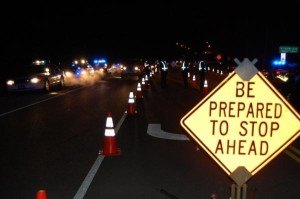Orange County DUI Checkpoints announced for November 20-22
Orange County DUI Checkpoints announced for November 20-22.
Our Orange County DUI Lawyers have learned from law enforcement about the Orange County DUI Checkpoints announced for November 20-22 (the weekend of November 20-22, 2015).
Police Departments all over issue press releases because they want to get the word out. so feel free to share this information to help others.
In Anaheim, there will be a DUI checkpoint from 8pm To 2:30am – on Nov 20, 2015, at West Ball Road at South Brookhurst Street.
In the City of Irvine there will be an Irvine DUI Checkpoint from 8pm To 2am on Nov 20, 2015 at Bake Parkway at Rockfield. Irvine is particularly aggressive about arresting people for Irvine DUI cases, and the Irvine Police Department has a DUI task force for this purpose.
Seal Beach has a Checkpoint looking for Drunk Drivers on Pacific Coast Highway at First Street from 6pm To 3am on Fri Nov 20, 2015.
Orange has a Drunk Driving Checkpoint from 9pm To 3am on November 20, 2015, at East Katella Avenue and North California Street.
The Santa Ana DUI Checkpoint is scheduled for November 21st (Saturday) from 9pm To 3am, and is located at West First Street and North Townsend Street in the City of Santa Ana.
In addition to the specific locations above, the Orange County Sheriff’s Department will have saturation patrols (specially trained officers, driving and looking for those driving drunk), patrolling the cities of Lake Forest, Mission Viejo and Rancho Santa Margarita. Statistically, this method is much more effective than DUI checkpoints, in Orange County and elsewhere.
Outside of the county, there are also DUI Checkpoints planned in Long Beach (on November 21), Pasadena (Nov. 20), and Topanga Canyon on November 20th.
WHY DOES LAW ENFORCEMENT HAVE ORANGE COUNTY DUI CHECKPOINTS?
DUI Checkpoints are even admitted by law enforcement to be less effective than other means of removing drunk drivers from the road. But, even though DUI checkpoints don’t work, police state they had a deterrent effect preventing people from driving in the first place. The truth is that funding in grants from the California Office of Traffic Safety (OTS), MADD, and the Federal Government ensure DUI checkpoints are used first before other measures.
ARE DUI CHECKPOINTS LEGAL?
The US Supreme Court, as well as the law in California, makes DUI checkpoints legal, as long as they follow certain criteria, including:
- Decision making by supervisors: This is important to ensure that checkpoints aren’t set up in “arbitrary and capricious” locations. The court didn’t say so, but we’re guessing they wanted to avoid any accusations of racial profiling.
- Limits on discretion of field officers: The theme of distrust of the officer continues. Strict procedures and a random selection of drivers according to a preset pattern (every third driver, for example) are suggested to avoid abuse.
- Maintenance of safety conditions: We’re not sure how it applies to constitutionality, but the court wanted lots of bright lights and signs.
- Reasonable location: The location should be based on relevant factors, such as areas with high incidences of DUI or DUI accidents.
- Time and duration: There are no hard and fast rules, but the timing should be set to optimize the effectiveness of the checkpoint. In other words, put ’em up when the drunks are out.
- Indicia of official nature of roadblock: This is more babble about bright lights and warning signs. They do mention that the lights and signage should be visible for the sake of notification to the drivers. Drivers also can’t be pulled over for avoiding the checkpoint, unless they violate a law to do so.
- Length and nature of detention: The time of the stop should be minimized as to infringe on a person’s rights as little as possible. That means peek at the eyes, smell for booze, and look for cans. If there are no signs of intoxication, the driver should be let go. If they look or smell drunk, field sobriety tests are appropriate.
- Advance publicity: Ingersoll was in favor of advance publicity. It referred to the deterrent effect and stated that the notice minimizes intrusiveness to a person’s rights. In 1993, the court in People v. Banks stated that publicity was not a requirement, but it certainly helps.
CONTACT US
Contact our firm if you have any questions about Orange County DUI Checkpoints.


